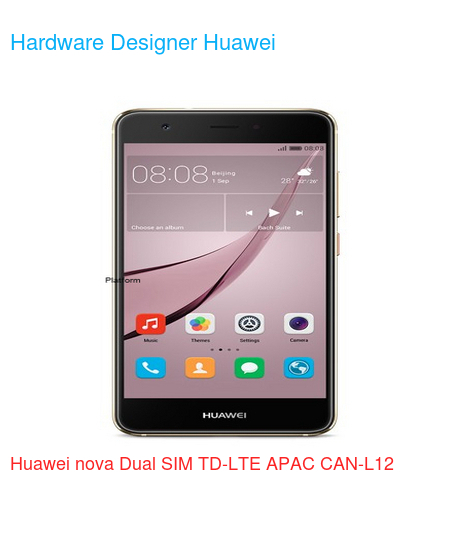| Brand | Huawei |
| Model | nova Dual SIM TD-LTE APAC CAN-L12 |
| Released | 2016 Oct |
| Hardware Designer | Huawei |
| Manufacturer | Huawei |
| Codename | Huawei Cannes |
| General Extras | Haptic touch feedback |
| Device Category | Smartphone |
| Width | 69.1 mm |
| Height | 141.2 mm |
| Depth | 7.1 mm |
| Dimensions | 2.72×5.56×0.28 inches |
| Mass | 146 g |
| Platform | Android |
| Operating System | Google Android 6.0 (Marshmallow) |
| CPU Clock | 2000 MHz |
| CPU | Qualcomm Snapdragon 625 MSM8953, 2016, 64 bit, octa-core, 14 nm, Qualcomm Adreno 506 GPU |
| RAM Type | LPDDR3 SDRAM |
| RAM Capacity (converted) | 3 GiB RAM |
| Non-volatile Memory Interface | eMMC 5.1 |
| Non-volatile Memory Capacity (converted) | 32 GB ROM |
| Display Diagonal | 127 mm |
| Resolution | 1080×1920 |
| Horizontal Full Bezel Width | 6.84 mm |
| Display Area Utilization | 70.6% |
| Pixel Density | 441 PPI |
| Display Type | Color IPS TFT LCD display |
| Number of Display Scales | 16.8M |
| Scratch Resistant Screen | No |
| Graphical Controller | Qualcomm Adreno 506 |
| Dedicated Graphics Memory | 0.125 MiB |
| A/V Out | No |
| Microphone(s) | stereo |
| Loudspeaker(s): | mono |
| Audio Output: | 3.5mm |
| Supported Cellular Bands | GSM850 , GSM900 , GSM1800 , GSM1900 , UMTS2100 (B1) , UMTS850 (B5) , UMTS800 (B6) , UMTS900 (B8) , UMTS800 (B19) , LTE2100 (B1) , LTE1800 (B3) , LTE850 (B5) , LTE2600 (B7) , LTE900 (B8) , LTE800 (B18) , LTE800 (B19) , LTE700 (B28) , TD-LTE2600 (B38) , TD-LTE2300 (B40) bands |
| Supported Cellular Data Links | GPRS , EDGE , UMTS , HSUPA , HSUPA 5.8 , HSDPA , HSPA+ 21.1 , HSPA+ 42.2 , LTE , LTE 300/50 data links |
| SIM Card Slot | Nano-SIM (4FF) |
| Complementary Phone Services | Voice transmission , Voice speaker , Vibrate , Speakerphone , ANC |
| Dual Cellular Network Operation | Dual standby |
| Sec. Supported Cellular Networks: | GSM850 , GSM900 , GSM1800 , GSM1900 |
| Sec. Supported Cellular Data Links: | GPRS , EDGE |
| Sec. SIM Card Slot | Yes |
| Touchscreen Type | Capacitive multi-touch screen |
| Expansion Interfaces | TransFlash , microSD , microSDHC , microSDXC |
| USB | USB 2.0 |
| USB Services | USB charging , USB Host , USB OTG 1.3 , USB PD |
| USB Connector | USB C reversible |
| Bluetooth | Bluetooth 4.1 |
| Wireless LAN | 802.11b , 802.11g , 802.11n |
| Wireless Services | Wi-Fi Tethering |
| FM Radio Receiver | FM radio (88-108 MHz) |
| Complementary Satellite Services | Simultaneous GPS , A-GPS , Geotagging , QuickGPS |
| Supported GLONASS protocol(s) | L1OF |
| Camera Placement | Rear |
| Camera Image Sensor | CMOS |
| Number of effective pixels | 12.0 MP camera |
| Aperture (W) | f/2.20 |
| Zoom | 1.0 x optical zoom |
| Focus | CD AF |
| Video Recording | 3840×2160 pixel |
| Flash | single LED |
| Camera Extra Functions | HDR photo , Macro mode , Panorama Photo , Face retouch |
| Aux. Camera Image Sensor | No |
| Aux. 2 Camera Image Sensor | No |
| Aux. 3 Camera Image Sensor | No |
| Aux. 4 Camera Image Sensor | No |
| Secondary Camera Placement | Front |
| Secondary Camera Sensor | CMOS |
| Secondary Camera Number of pixels | 8.0 MP sec. cam |
| Secondary Aperture (W) | f/2.00 |
| Secondary Video Recording | 1920×1080 pixel |
| Secondary Camera Extra Functions | Face detection , Face retouch |
| Sec. Aux. Cam. Image Sensor | No |
| Built-in compass | Yes |
| Built-in accelerometer | Yes |
| Built-in gyroscope | Yes |
| Additional sensors | FP sensor , Hall , L sensor , P sensor |
| Protection from solid materials | Yes |
| Protection from liquids | Yes |
| Battery | Li-ion polymer (LiPo) |
| Nominal Battery Capacity | 3020 mAh battery |
| Market Countries | India , Japan |
| Market Regions | Asia , Southeast Asia |
| Added | 2024-06-25 |
Specifications data description of this 📱Huawei nova Dual SIM TD-LTE APAC CAN-L12📱
Title: The Ultimate Specification Guide for Your Device 🌐📅🏋️🌈🤖🛠️🚀🔧💪🖥️🎮🗂️📷🎥🔈📡💡🔥🔋🔌
Introduction:
Welcome, technology enthusiasts! Today, we’re diving deep into the fascinating world of device specifications. We’ll explore everything from the network and launch details to the design, features, and battery life of your favorite devices. Let’s get started! 🌐📅🏋️🌈🤖🛠️🚀🔧💪🖥️🎮🗂️📷🎥🔈📡💡🔥🔋🔌
Lineup:
In this comprehensive guide, we’ll examine several devices, comparing and contrasting their features to help you make an informed decision. We’ll look at the latest smartphones, tablets, laptops, and other portable devices. 📱💻🖥️
Design:
The design of a device plays an essential role in its functionality and appeal. We’ll analyze aspects such as the materials used, dimensions, weight, color options, and overall aesthetics. Additionally, we’ll explore how design influences user experience and ergonomics. 🏋️🌈🖇️📏📐
Specifications:
Now let’s talk numbers! This section will cover the nitty-gritty details of various device components.
🌐NETWORK: We’ll discuss connectivity options, such as Wi-Fi, cellular network, Bluetooth, and NFC capabilities.
📅LAUNCH: We’ll provide insights on the launch date, OS version, and software updates.
🌈DISPLAY: We’ll explore the screen size, resolution, panel type, refresh rate, and other display-related features.
🤖OS & 🛠️CHIPSET: We’ll delve into the operating system, chipset, and architecture of each device.
💪CPU & 🖥️GPU: We’ll breakdown the central processing unit (CPU) and graphics processing unit (GPU) specifications.
🗂️MEMORY: We’ll look at RAM, storage capacity, and storage type.
📷CAMERA & 🎥VIDEO: We’ll examine camera and video specifications, such as megapixel count, aperture, and video recording capabilities.
🔈SOUND: We’ll explore sound quality, speaker specifications, and audio-related features.
📡COMMUNICATIONS: We’ll cover connectivity options, such as Wi-Fi, cellular network, Bluetooth, GPS, and NFC capabilities.
💡FEATURES: We’ll delve into unique features like biometric authentication, water resistance, expandable storage, and more.
🔋BATTERY & 🔌CHARGING: We’ll explore battery capacity, charging speed, and battery life expectations.
Conclusion:
Thank you for joining us on this journey through the world of device specifications! We hope this guide has been informative and helpful. Don’t forget to leave a comment and tell us which features matter most to you in a device. We’d love to hear from you!
Until next time, stay curious, and keep exploring! 🔬💡💻📱🖥️🚀














